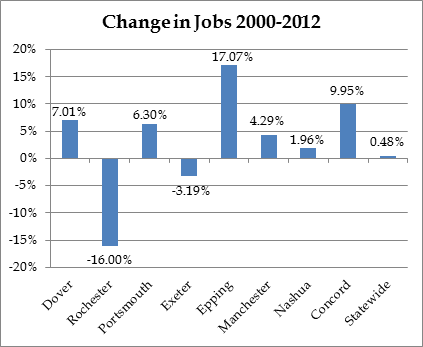We have a bit more info on that post of a little while ago based on the Concord Monitor story. You can find the study, all of four pages long, here: http://www.jbartlett.org/does-commuter-rail-create-jobs
One of the nuggets we most enjoyed is this one:
Researchers at the Brookings Institution also found little evidence that rail transit investments have significant impacts on urban form. The only way for rail to have an impact, they found, would be to make private car ownership and usage prohibitively expensive.
The Brookings Institution, we should note, is generally considered liberal or ‘liberal-leaning,’ and was used as the credible source in the Smart Growth study/proposal put forward a half dozen years or so ago as the salvation for Maine, and it’s path to a glorious future. Think “quality of place’ and all that. Raised crosswalks, back-in parking, and anything else required to make it real.
Here is the complete conclusion:
=======================================================
Drawing Conclusions:
An analysis of town by town jobs numbers here in New Hampshire shows that merely having access to passenger rail does not create jobs. After a decade of continuous rail service in Dover added jobs, Durham remained unchanged, while Exeter lost jobs.
Can Dover’s impressive growth be attributed to regular passenger rail service? Not necessarily; both Epping and Concord saw greater growth rates over the time frame, and neither has passenger rail service. With the exception of the redevelopment of the downtown mills, the majority Dover’s growth has been on the peripheries of the city in industrial and business parks.
It does not appear that Rochester’s loss has been Dover’s gain either. Comparing the jobs figures, there is no evidence that Rochester’s lost jobs simply moved to Dover. Rather, larger employment trends explain this shift. Statewide, the number of manufacturing jobs has fallen by more than 35,000, replacing them with roughly the same number of service sector jobs. Dover, with its large service sector, was well positioned to benefit from this trend, while Rochester, with its large manufacturing sector, was harmed by it.
Exeter’s loss of jobs is particularly telling because it turns the entire notion that rail service creates jobs on its head. The argument that rail minimized Exeter’s job losses does not hold much weight since neighboring Epping saw substantial gains.
What does this tell us about commuter rail’s ability to create jobs? From the studies that have been conducted after rail service has started and the experience of the Downeaster here in New Hampshire, simply having commuter rail does not create jobs. Rail, whatever its benefits may or may not be, is not a tool to spur job creation.
================================================================
The interesting approach in the study is the ‘paired comparison’ of communities experiencing changes in employment.
Once again, just so they sink in, reconsider these words:
The only way for rail to have an impact, they found, would be to make private car ownership and usage prohibitively expensive.
Don’t for a moment doubt that those among the rail fan elites would propose such policies. You do what you have to do to make your premises and promises look valid. And the three sisters are always available to chip in.
In dubbing around, we also came across this older item: http://www.jbartlett.org/highways-pay-for-themselves-trains-don’t
Published in September, 2012, it begins with these words:
In a few weeks, Maine will finish a $44 million project to extend a money-losing commuter train and lose even more money. Fortunately, retiring Sen. Olympia Snowe got them money in the federal budget to fund their profligacy. Some politicians in New Hampshire want to follow suit and spend money we don’t have in the state budget to restore a commuter train that last operated for parts of 1980 until the federal dole ran out.
Hopefully, these referrals will help you overcome your boredom with local spending and property tax concerns.
Any horse in a storm, right?

No comments:
Post a Comment